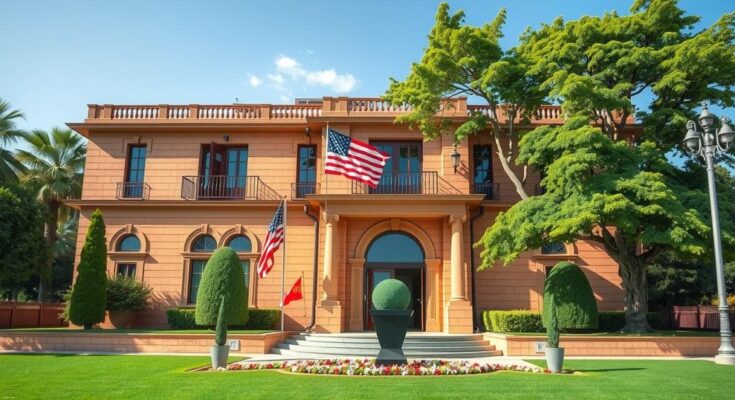The US ambassador’s residence in Syria has reopened, signaling warming ties between Washington and Damascus. Tom Barrack visited Syria to inaugurate the residence and signed agreements for a massive energy project involving US, Qatari, and Turkish companies, aiming to revitalize Syria’s electricity needs. This move follows the Trump administration’s decision to roll back sanctions on Syria, reflecting a shift in US diplomatic strategy toward the region.
In a notable gesture towards improving relations, the US ambassador’s residence in Damascus officially reopened on Thursday, marking a potentially significant turn in diplomatic interactions between Washington and the Syrian government. An American flag was raised outside the long-closed residence, signaling a thaw in relations. Tom Barrack, the US ambassador to Turkey who will also serve as the special envoy to Syria, led this reopening during his visit to the Syrian capital.
During his time in Damascus, Barrack had a meeting with Syrian President Ahmad al-Sharaa, where an agreement was signed for undertaking a substantial energy project. This collaboration involves a consortium of companies from Qatar, Turkey, and the US aimed at revamping much of Syria’s war-damaged electricity infrastructure. The ambitious project includes the development of four combined-cycle gas turbines capable of generating approximately 4,000 megawatts, alongside a 1,000-megawatt solar power plant.
UCC Concession Investments, Power International USA, and Turkey’s Kalyon GES Enerji Yatirimlari & Cengiz Enerji are leading the project. According to UCC, once completed, these initiatives are anticipated to meet over 50 percent of Syria’s electricity requirements.
The US embassy in Damascus has remained closed since 2012, following violent protests against the regime of former President Bashar al-Assad, which led to a devastating civil war. While the embassy remains shuttered, Barrack’s visit, coupled with the flag-raising ceremony, indicates a warming trend in policies towards Syria.
Initially, there was skepticism from Washington regarding the new leadership in Syria, especially under Ahmad al-Sharaa, a figure associated with an Islamist group labeled as a terrorist entity by the US. However, recent shifts suggest a change, particularly as the Trump administration, supported by Saudi Arabia and Turkey, expressed growing willingness to engage with the Syrian government.
Earlier this month, Trump met discreetly with al-Sharaa in Riyadh during his first Middle East trip since beginning his second term. Following this meeting, the US has started to ease longstanding sanctions imposed on Syria under al-Assad. During the ceremony for the energy agreement, Barrack commended what he termed a “bold decision” to lift those sanctions, emphasizing that the new engagement comes without any preconditions.
Barrack called for collaboration among the involved nations, asserting that the single expectation is their alignment—a message underscored by the flags of the respective countries on display. The US State Department further conveyed support through a statement on social media, mentioning Barrack’s new role and the potential of working with Syria to foster stability and peace in the region, as attributed to Trump.
Barrack, in turn, complimented Trump’s “bold vision,” expressing hope that the historically rich region would reclaim its destiny through self-determination. Amid ongoing discussions about striking deals and paving paths for cooperation, this entire situation illustrates a noteworthy bid to reshape US-Syria relations in what has been a historically complex scenario.
The reopening of the US ambassador’s residence in Syria marks a pivotal moment in the American approach to Damascus, potentially facilitating a cooperative future. As discussions progress over significant energy projects and resulting agreements, the implications of these developments could reshape the regional dynamics. With the US now easing sanctions and engaging in dialogue with Syria’s new leadership, the situation signifies a sharp shift in diplomatic relations following years of tension and conflict.
Original Source: ca.news.yahoo.com




